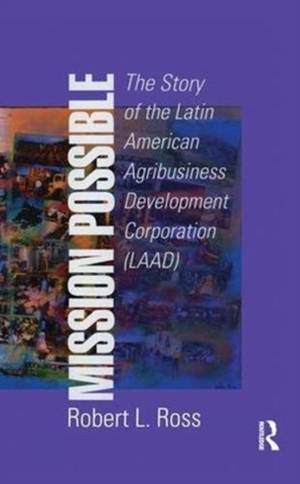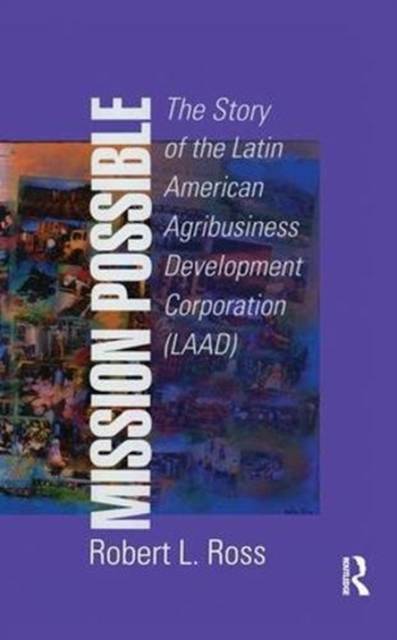
- Retrait gratuit dans votre magasin Club
- 7.000.000 titres dans notre catalogue
- Payer en toute sécurité
- Toujours un magasin près de chez vous
- Retrait gratuit dans votre magasin Club
- 7.000.0000 titres dans notre catalogue
- Payer en toute sécurité
- Toujours un magasin près de chez vous
Mission Possible
The Latin American Agribusiness Development Corporation
Robert Ross
Livre broché | Anglais
62,45 €
+ 124 points
Format
Description
The Latin American Agribusiness Development Corporation (LAAD) was one of many initiatives taken at the height of the Cold War to alleviate poverty in countries threatened by communist insurgencies. Its mission was to promote rural development by funding local agribusiness enterprises to create new permanent jobs and new economic activity. In Mission Possible, Ross, president of LAAD from 1972 to 1998, gives a richly detailed insider's account of the company's first three decades.Originally capitalized with a little over $2 million, and beginning with the small economies of Central America, it gradually expanded into the Caribbean islands and South America and now is a factor in 25 countries. To date, LAAD has provided over $300 million to 700 projects, generating tens of thousands of new jobs and new annual exports of $500 million. Always profitable, it has paid a dividend for twenty years. Its capitalization has grown to over $30 million by reinvesting most of its earnings in Latin America. Since LAAD was committed exclusively to Latin America, it had to contend with an often unsettled political environment; it could not simply stand on the sidelines and wait for conditions to improve. Indeed in a broader sense LAAD's mission was to help improve those conditions.Mission Possible describes a small but significant chapter in a broader context of how the world's rich countries have tried to raise living standards among their poorer neighbors. Students of economic development and international business management will learn much from the story of how this unique experiment grew into a dynamic enterprise."[Ross] offers innumerable studies [in Mission Possible] of investment projects that stimulated the commercial production of agricultural produce in the region. He recounts the frustrating negotiations with uncomprehending central bankers and the difficulties of developing marketing and other infrastructural networks that are so important for assuring the success of any business, and is pleased with what he identifies as the two most significant changes that profoundly affected agriculture: the decline in the role of the state in Latin America and in protectionism in the industrialized world. ... He stresses the fundamental roles that innovative entrepreneurs can play, taking advantage of opportunities created by organizations like LAAD, and using market information to reduce uncertainty." -David Barkin, Latin American Research ReviewRobert L. Ross, a Harvard-educated development economist, has worked for forty years in Latin America. He taught economics at the Latin American Economic and Social Planning Institute in Santiago, Chile and worked on the first development plans in Haiti and Paraguay. He was president of the Latin American Agribusiness Development Corporation from 1972 until his retirement in 1998.
Spécifications
Parties prenantes
- Auteur(s) :
- Editeur:
Contenu
- Nombre de pages :
- 160
- Langue:
- Anglais
Caractéristiques
- EAN:
- 9781138512269
- Date de parution :
- 09-02-18
- Format:
- Livre broché
- Format numérique:
- Trade paperback (VS)
- Dimensions :
- 203 mm x 127 mm
- Poids :
- 452 g

Les avis
Nous publions uniquement les avis qui respectent les conditions requises. Consultez nos conditions pour les avis.






